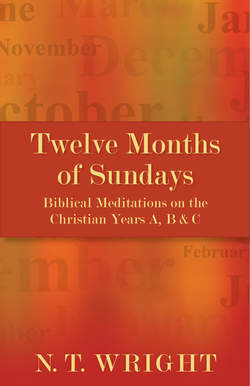Читать книгу Twelve Months of Sundays - N.T. Wright - Страница 11
На сайте Литреса книга снята с продажи.
ОглавлениеThe Third Sunday of Advent
Isaiah 35.1–10
James 5.7–10
Matthew 11.2–11
One of the recently edited Dead Sea Scrolls (no. 521 of the Cave 4 collection, if anyone out there wants the reference) contains a portrait of the coming Messiah that, like Matthew 11, looks back to Isaiah 35: ‘He will … free prisoners, giving sight to the blind, straightening out the twisted … and he will heal the wounded and make the dead live, he will proclaim good news to the meek, give to the needy, lead the exiled and enrich the hungry.’ These ideas were clearly ‘in the air’ at the time of Jesus: when the Messiah came, the lavish programme of healing and restoration outlined by Isaiah would be put into effect.
Nobody knows, of course, just how literally people took it. Scholars debate whether, for instance, the Qumran community expected the literal resurrection of the dead. But nor can anyone doubt that Jesus’ reply to John was about as clear a messianic claim as could be made without spelling it out explicitly inch by inch. (John had heard in prison, says v. 2, of ‘the deeds of the Messiah’, not ‘what Christ was doing’; making ‘Christ’ a proper name here neatly misses the point of the whole paragraph.)
But why would Jesus want to be reticent? The rest of the passage makes it clear: there was already a king of the Jews, and the house of Herod had a bad track record, to put it mildly, when it came to tolerating other would-be kings. John, from whom the question had come, was after all in Herod’s prison at the time.
So why was John still there? If Jesus really was the Messiah, why didn’t he free prisoners like John as well as giving the blind their sight? There is a dark mystery here, to do with the now-and-not-yet of the gospel, both in Jesus’ ministry and after his death and resurrection. Hence James’s call to Advent-style patience: yes, the Judge is already known, and is even now at the doors, but precisely for that reason do not expect to see everything sorted out in the present. That is both the glory and the frustration of Advent.
But it’s no reason for not implementing as much of the agenda as we can here and now. The New Testament writers believed that Isaiah 35 was in principle fulfilled in Jesus, who brought the ransomed of the Lord back from the Babylon of death itself, opening up the new day whose watchword is ‘Be strong! Don’t be afraid!’ His healings, and his call to a new and joyful holiness, have set up the highway to the true Zion, and he invites all and sundry to follow him along it. Don’t follow the Herods of this world; they are just reeds shaking in the wind (Herod Antipas had chosen a Galilean reed as the symbol on some of his coins). Follow the prophetic pointings of Isaiah and John, and come to the kingdom that transcends them both.
